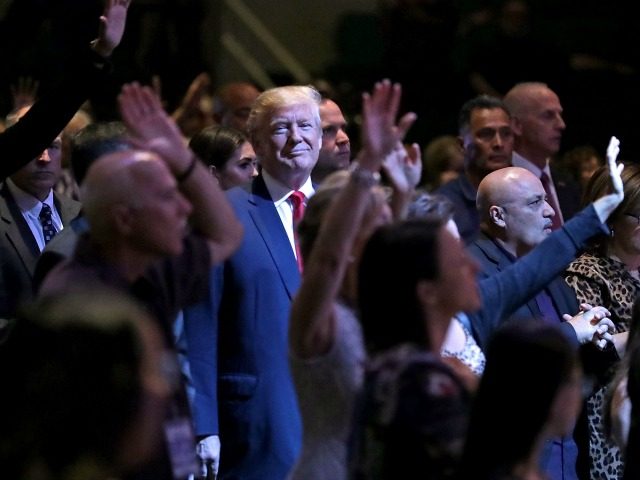Conservative Christians gave Donald Trump 79 percent of their votes, Ralph Reed, founder and chairman of the Faith & Freedom Coalition, told reporters Wednesday.
That split left 15 percent voting for his Democratic rival Hillary Clinton, Reed said.
Evangelical Christians and observant Catholics made up 33 percent of the electorate, according to polling by Glen Bolger and Public Opinion Strategies. “It is the highest share of the electorate made up of conservative Christians in a presidential election in the modern era,” Reed said.
“If these voters had stayed home, as some observers thought they would do, Donald Trump would have lost this election by a certain Johnson-Goldwater-type margin,” he said. In 1964, President Lyndon B. Johnson beat Sen. Barry Goldwater (R.-Ariz.) with 61 percent of the vote to Goldwater’s 39 percent. “It’s very, very significant.”
In the 2016 cycle, it was a two-way street for Trump’s outreach to conservative Christians, he said. No Republican nominee had ever made the consistent effort to connect with conservative Christians than Trump.
The usual playbook is for the GOP to embrace conservative Christians in the primaries and then, in the general election push them off stage and off camera, out of fear that being close to conservative Christians would offend other communities that Republicans wanted to attract, he said. “Trump did not use that playbook.”
Reed said, “We knew we were looking at something big, when we did our phone banking for our final weekend.”
In the Faith & Freedom Coalition phone bank operation, a universe of 15.6 million conservative Christians living in 9.5 million households were identified in 11 key battleground states, he stated.
The phone banks were tied to the outreach field operation that sent 26 million cell phone ads to 3.8 million targeted voters, Reed said. “We were knocking on doors. We knocked on 1, 253, 778 doors in the top 11 states. We were distributing voter guides. We were dropping mail–all these things.”
If voters replied they had turned in an early or absentee ballot, they would be taken out of the outreach program and the digital ads. Door knocks and phone calls would be directed at someone else. “When we did our final purging for the final weekend, 48 percent of the entire universe had already voted,” Reed said.
“That included states like Pennsylvania and Michigan and many other states that don’t even early-vote,” he said. “I had never in my career–and I have been doing this for 27 years–never seen an early vote number for this constituency that exceeded the mid-thirties, so we knew something big was happening.”
The FFC analysis showed that broken out as a separate cross tab, Catholics contributed mightily to the overall Christian support for the New York City developer, he said.
“Catholics are the swing vote in American politics,” Reed said. White Catholics, who are one out of six voters, voted 54 percent for Trump and 36 percent for Clinton.
Catholics helped Trump win Ohio, Iowa, Pennsylvania, and Wisconsin, he said.
Broken out separately, the evangelical vote went for Trump by astonishing margins, Reed said: in Florida, by 85 percent to 13 percent; Georgia, by 88 percent to 6 percent; and Wisconsin, by 71 percent to 24 percent.
After the repeal of Prohibition in 1933, evangelicals retreated from the public square, after being an active and accepted part of the process from the beginning of the Republic, he said. When Georgia Gov. James “Jimmy” E. Carter announced that he was a born-again Christian during his 1976 presidential race, it triggered a political reawakening for evangelicals, which have now reached an acceptance and a maturity after many years of awkwardness and resistance from other political players.
There was no way of knowing how many people the Democrats would be able to drive to the polls, he said.
It was obvious, however, that conservative Christians were going to swamp the polling stations, he said.
“But, there was never any doubt in our mind–this was my tenth presidential cycle–I never seen a time, whether it was Obama in ’08, whether it was Reagan in ’80, or whether it was Trump this year, where the primary votes spiked, but those same voters did not turn out in the general,” he said.
“In my experience, if you vote in the primary, you’re coming to the general, so we always believed they would come in huge numbers.”

COMMENTS
Please let us know if you're having issues with commenting.